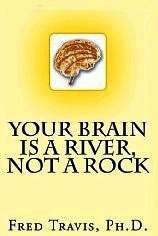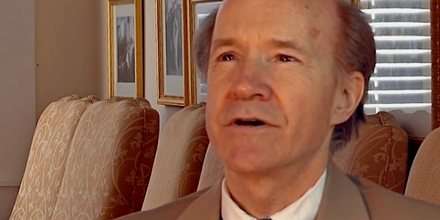
In the field on neuroscience, Dr. Fred Travis is known as one of the leading scientists studying the effects of Transcendental Meditation on brain functioning.
Tmhome.com decided in turn to study the effects of Transcendental Meditation on the functioning of Dr. Travis.
Why did you learn the Transcendental Meditation practice?
DR. FRED TRAVIS: At the time I was working with a semi-professional theater group. We did summer stock on Cape Cod, Massachusetts, and then fall, winter and spring we would tour around the countryside. I was the stage manager – once we’d get to a place I was in charge of where the props would be, where the lights would go, where the entrances and exits would be.
Some days it was really easy to do. It’s like I walked in and the whole plan was there; I just had to go through the steps. Other days it was like walking through mud.
I really had this experience that there was more of ME available – a mind which is clear and a much broader grasp of the situation – at some times rather than others. That’s what propelled me to look at different meditations, because school doesn’t teach you to develop your inner potential. At school you learn skills and facts and ways to deal with problems, but they don’t really teach you how to deal with the knower himself or herself.
So I went to a lecture on Transcendental Meditation and they talked about using only part of your full potential. They talked about the mind having an active surface and a silent depth, and that we’re not taught how to use the silent depth of the mind. It just really fit with my experience. So I learned TM.
Had you heard or read anything about meditation before?

DR. FRED TRAVIS: I had read all the books that were out there on meditation. So, I had a sense that meditations are systematic procedures to develop and explore inner potential. I think what impressed me with TM is all the scientific research that had been conducted. They would describe quieter levels of the mind and body, and you could see changes in the brain and psychology – and that satisfied my intellect.
When I learned Transcendental Meditation, I was completely hooked! It was really true: the mind has an active surface and it has a quiet depth. During TM, you can experience that and it’s broad and it’s expanded and it’s who you are. I was suddenly more me than I ever was before in my whole life. I was 22 when I learned TM, so it was just the time when I was trying to take control of who I was and where I was going. I learned TM at the perfect time in my life.
One could say that TM practice turned your life 180 degrees—you moved from theater to neuroscience?
DR. FRED TRAVIS: I had dropped out of school to join the theater group. After I learned TM I realized I should go back to school, so I did. I got a degree in design and environmental analysis at Cornell University.
Also, during that time between dropping out of school and going back, I went on a teacher training course to become a teacher of the TM program. I went back to school at Cornell University, I was a TM teacher, and in between classes I would go and give talks in other classes about the TM program and how it related to creativity and psychology.
My senior thesis was on the effect of TM practice on creativity. It was a matched group of Cornell undergraduates who came to the introductory lectures and some decided to learn and some did not. That was my first foray into science and that was extremely enlivening.

I would grade all the creativity tests, blinded as to who were the meditators and who were not. I would see huge transitions in some students, and I wondered: Are these the TM people? They’re really seeing things differently; they’re just being more playful in their responses. And when we broke the code they did turn out to be in the TM group!
In creativity problem-solving, you really appreciate what transcending does. Without transcending it is hard to think outside of the box. The “box” is the problem space. Without transcending, you’re stuck in the box, you’re stuck in the words and concepts and problems which are there and you don’t have the broad awareness to see outside of that.
And when you transcend every day you step outside of that box; you step outside of time and space, outside of body sense, and you are just awake, you’re alert. And when you bring that quality of the mind back to whatever you are doing, you see the world completely differently.
What’s the role of that increased creativity that Transcendental Meditation brings in being a good scientist?
DR. FRED TRAVIS: Scientists have a stereotype of being very rational and cerebral, intellectual. But the reality is that science starts with a hunch. You collect data and then you have an insight – “I think this is what’s happening“.
I tell my students that science is telling a story. But in science you get the plot line from nature and then you just fill it out. You have an idea, you design the research, and you collect the data. The actual findings define what the story is. That’s the huge challenge in science. Once you have the data you have to step back. There is something in science called theory-laden data. If you’re only look for what you expect to see, you’ll only find that. You have to step back and think: okay, what is actually there? In this process of in and out is where the true scientific discoveries begin.
What has been the most exciting, surprising research finding?
DR. FRED TRAVIS: I think what was the most startling and for me the most significant finding was that people master transcending during Transcendental Meditation practice very quickly. Because TM uses the natural tendency of the mind, individual practice, individual ability doesn’t make the process of transcending to go any better.
I first saw this when I came back to be the director of the brain center (at Maharishi University of Management) in 1990 and started working on a brain integration report card.
Watch a video interview with Dr. Fred Travis
Croatian National TV, May 2013 (with English subtitles):
I had become aware of how the brain changes dramatically over the first 20 years of life. Between age 10 and 18 is the process of losing connections between brain cells – a process called pruning. A child has twice the number of brain connections than an adult does. It’s this high level of brain connections from 3-10 that allows them to learn language, rule-governed behavior, and socialization. At age 10 the process of pruning begins. Brain connections that have been used remain and connections that have not been used drop off.
So I looked at our first year students, average age 19 who had just learned TM a few months earlier. I compared them with those students who had attended the Maharishi School and had been meditating since they were 10.
This design compares students who had been transcending during this period of pruning to those who had not.

Much to my surprise there was no difference in the EEG patterns during the TM practice itself – EEG patterns of someone who’s been meditating for a few months were similar to those who has been meditating for 8 years.
I thought, “Wait a minute! This does not make sense!” Practice is supposed to make one better; experience is known to change the brain. I looked at the data for 3 months. I thought, “Oh, my mistake. Did I analyze the data correctly… I must have done something wrong.” And after 3 months, when the results would not go away, I had to accept that with TM practice you master transcending very quickly.
Luckily I had 3 minutes of EEG data that I took to check the stability of the EEG. It was eyes-open EEG when students are just sitting quietly. I compared that for both groups and that’s where the difference was seen.
In people who had been meditating for 8 or more years, the EEG patterns seen during TM were seen in their eyes open EEG. That was a whole picture for me!
When we teach people to meditate we say that we transcend to locate the transcendental inner infinity and we act to bring it out. Because TM is effortless you’re getting to pure consciousness in the very beginning of your meditation career and the real marker of long term practice is how much you have brought out to the activity.

As Maharishi used to say, we experience the goal in every step of the path. Even in the very beginning days of meditation, we’d sit, we’d close the eyes, and we’d experience the goal.
In the beginning days the contrast between eyes open and TM practice is huge. Over time what happens is – and this is important for people who have been meditating for 10 years or 20 years – you are going to find that the contrast between the eyes open and meditating practice is less. You should look to your activity to watch growth of higher states of consciousness.
So, I think that finding was the most significant for me.
Something you did not want to accept at first?
DR. FRED TRAVIS: (laughs) It didn’t make any sense to me!
Actually this reality of the quick mastery of transcending, and the simplicity and immediate benefits of TM practice, makes it ideal for inclusion in an academic program.
Here at Maharishi University of Management, students come in and if they have not learned meditation, they learn it in their first class.
If it wasn’t an enjoyable experience they would not do it. But it is easy to learn and practical benefits start from the first meditation session.
How else, besides giving a new direction to your career, has Transcendental Meditation practice changed your everyday life?
DR. FRED TRAVIS: The change isn’t so much in terms of outer behavior. There’s a saying: Before enlightenment a man chops wood and carries water; after enlightenment he chops wood and carries water. Perception of the world is the same. We still through the eyes, and hear through the ears. What’s happening is the screen of the mind upon which everything falls is changed.

Before you start mediating you’re really lost in the experience; whatever is going on completely determines that experience, whether it is good, or happy, or sad or successful. And the feeling from that experience you take with you. You’re really happy, then you see someone get hurt and now you’re really sad – so you’re a football to the environment.
By moving your mind to the transcendent and back to waking over and over, the depth of inner silence begins to come into the world. It’s as though your level of awareness is going from being constrained by blinders to being broader and fully awake. Before, something would completely grip your awareness. Now you see it in context. You begin to less get lost in the experience. Now you are living the flow of life that underlies and connects changing events.
As inner silence becomes lively at the depths of the mind, something else happens. An experience that before would be stressful, becomes just a challenge—it is an opportunity to see how effective you can be. In the brain there’s a difference between challenge and stress. Under challenge the brain stem activates the whole brain; under challenge you see more clearly, you hear more distinctly, the brain actually processes experience more quickly. With challenge you have lots of creative ideas, lots of mental energy, physical energy.
Watch a video about a recent research study led by Dr. Travis that investigated the effects of the Transcendental Meditation program on Ugandan refugees who had severe PTSD symptoms. In 10 days, the symptoms were significantly decreased; after 30 days of TM, their PTSD symptoms had disappeared. Video by MUM.
http://www.youtube.com/watch?v=sUaqasFKuTo
When the challenge gets too high, the brain actually shuts itself off. The CEO, the frontal part of the brain which directs decision making, stops functioning and you focus on the back part of the brain which gives you the concrete present. So now you’re just lost in the details of the problem.
What I think TM is doing is erasing that line between challenge and stress. You can take on increasingly more and more challenge without it becoming stressful. I think some of that is because you never have the perception that it’s too much, you never have the perception that this experience is going to overtake you.
 You just know that: oh this is really big, or yes I’m going to have to really focus on this, but you never feel like it’s bigger than you, like it’s going to eat you up! You know that you have the mental energy, the problem solving skills, to actually deal with what’s going on. You may have to go to the internet, tutorials, talk to experts, but you know that you can do it.
You just know that: oh this is really big, or yes I’m going to have to really focus on this, but you never feel like it’s bigger than you, like it’s going to eat you up! You know that you have the mental energy, the problem solving skills, to actually deal with what’s going on. You may have to go to the internet, tutorials, talk to experts, but you know that you can do it.
And it’s interesting because it is not an affirmation that you have to remind yourself of in your head! It’s just how you feel, how you’re living your life. Life becomes a game. It is full of challenge that keeps you alert and moving forward. Every morning you wake up looking forward to what comes your way. It is how life should be lived.


















